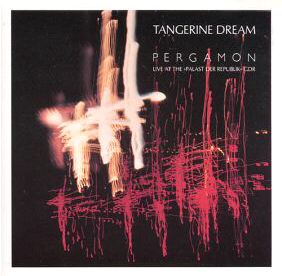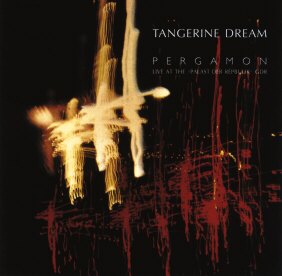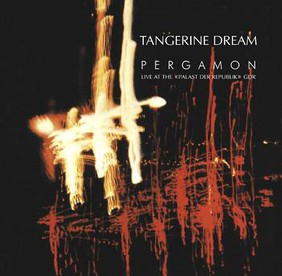 |  | |||||||||||||||||||||
Tangerine Dream Quichotte- Live/Studio, released June 1980 - | |||||||||||||||
Covers |
| ||||||||||||||
Tracks |
| ||||||||||||||
Details |
| ||||||||||||||
Notes | Johannes Schmoelling made his first public appearance as a member of Tangerine Dream during their January 31st, 1980 concerts at the 'Palast der Republik' in the former East Berlin, particularly notable since TD was the first Western "rock" band allowed by the Communist government to perform there. The few tickets made available to the general public had been changing hands on the black market for up to two months' wages. | ||||||||||||||
In an interview with Jonathan Miller Edgar Froese remembered: "The Palast der Republik was where parliament sessions were held and important political speeches made, so we had to agree not to make any political statements and just play music -- nothing that would collide with the political system. Since it was the first concert of a Western band in East Berlin and in such a high profile place, all the international press were outside with cameras everywhere, because 80% of the tickets were given away to officials and organisations connected with the East German government. The remaining 20% sold out in about five minutes. About half an hour prior to the show there was a very delicate moment because 900 people were pressing against the venue's huge glass windows trying to get in. Inside, we had to make a decision: Did we want lots of publicity by allowing the windows to be damaged -- maybe people would be hurt or worse -- and blowing the gig? A public relations company would say we were stupid, but from my perspective of performing our music, it was very simple: I told the officials we would not perform unless they let those people in for free, thus preventing any trouble. They did and that was the first time I found out exactly what political journalism was all about: Writing something sensational and extraordinary brings success, but at what expense? On the other hand, we had a wonderful concert. As far as the music was concerned it was just great, but for political international journalism it was a total disappointment. The entire gig just got one small mention in a daily newspaper the next day -- no-one was really interested. If we were to do it again today, I would make exactly the same decision." | |||||||||||||||
An album recording of highlights of the evening concert, titled Quichotte, was released that year on the East German label Amiga only. It consists of two long tracks of partly improvised music. Themes from the album Tangram can be heard throughout the album, as the concert took place during the process of preparing material for that studio album. Edgar Froese and Chris Franke had remixed and edited the music in East Berlin as part of the original deal: so they cut the 100 minutes down to the length of a 45 minute vinyl album and replaced some live parts with studio creations. The complete evening concert (taken from a radio broadcast) has been fan-released as Tangerine Tree Volume 17: East Berlin 1980 and later officially released as part of The Official Bootleg Series Volume Two (2016). It is considerably different from the official album release. | |||||||||||||||
Re-Releases | |||||||||||||||
In 1988 a counterfeit (an illegal pirate re-release) of the original Quichotte album was released in a few hundred copies in Germany. The pressing quality is lousy, and the record is only interesting for its big, foldout-poster-cover, showing a black and white photo of the band in East Berlin. Some copies include a sticker with the title "Don Quixotte". Copies on multicoloured vinyl were announced, but have not yet been spotted. | |||||||||||||||
Pergamon | |||||||||||||||
Six years after its initial release, in April 1986, the album was made available to the rest of the world by Virgin both on vinyl and CD. It was now titled Pergamon (after the impressive museum in East Berlin) and featured a completely different cover. The music material and its mix is identical to that of Quichotte. | |||||||||||||||
In early April 2012 the British Esoteric Records re-released Pergamon as part of a partial re-issue of the TD back catalogue. The album was completely remastered and comes with a nice 16-page booklet including numerous photos plus an essay written by journalist Malcolm Dome. There are no bonus tracks. | |||||||||||||||
Releases |
| ||||||||||||||
Copyright/Disclaimer © 2001-2025 by Michael Berling. Last Update: 2025-01-03 17:20 |




